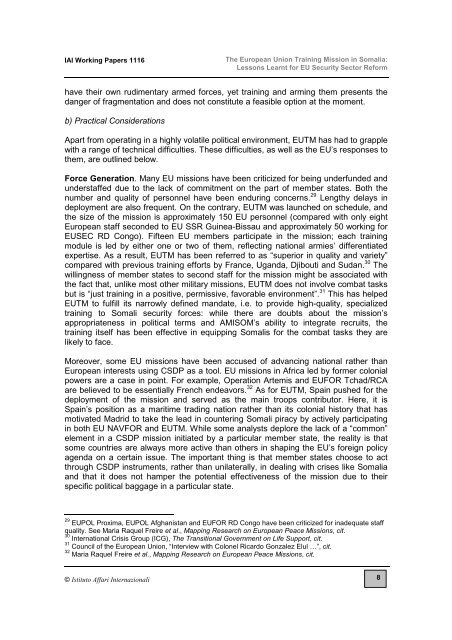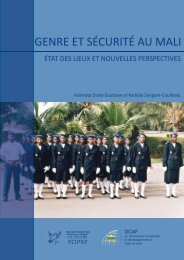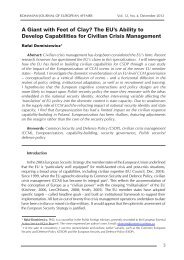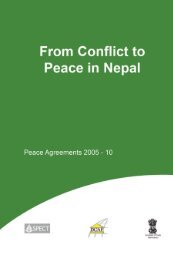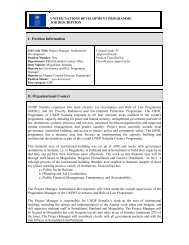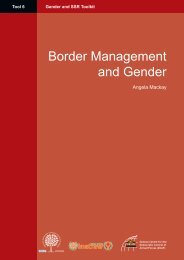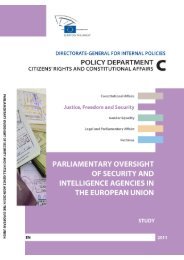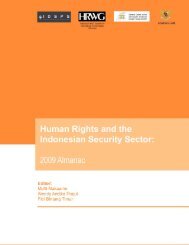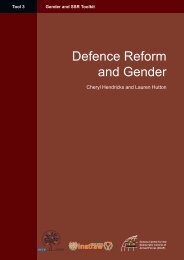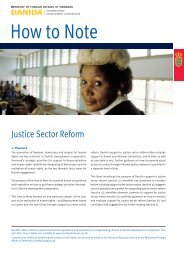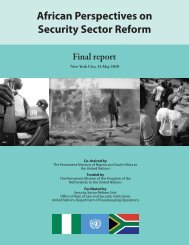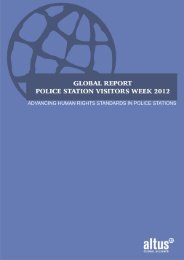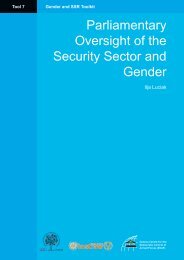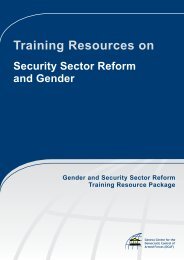The European Union Training Mission in Somalia: Lessons ... - ISSAT
The European Union Training Mission in Somalia: Lessons ... - ISSAT
The European Union Training Mission in Somalia: Lessons ... - ISSAT
- No tags were found...
Create successful ePaper yourself
Turn your PDF publications into a flip-book with our unique Google optimized e-Paper software.
IAI Work<strong>in</strong>g Papers 1116<strong>The</strong> <strong>European</strong> <strong>Union</strong> <strong>Tra<strong>in</strong><strong>in</strong>g</strong> <strong>Mission</strong> <strong>in</strong> <strong>Somalia</strong>:<strong>Lessons</strong> Learnt for EU Security Sector Reformhave their own rudimentary armed forces, yet tra<strong>in</strong><strong>in</strong>g and arm<strong>in</strong>g them presents thedanger of fragmentation and does not constitute a feasible option at the moment.b) Practical ConsiderationsApart from operat<strong>in</strong>g <strong>in</strong> a highly volatile political environment, EUTM has had to grapplewith a range of technical difficulties. <strong>The</strong>se difficulties, as well as the EU’s responses tothem, are outl<strong>in</strong>ed below.Force Generation. Many EU missions have been criticized for be<strong>in</strong>g underfunded andunderstaffed due to the lack of commitment on the part of member states. Both thenumber and quality of personnel have been endur<strong>in</strong>g concerns. 29 Lengthy delays <strong>in</strong>deployment are also frequent. On the contrary, EUTM was launched on schedule, andthe size of the mission is approximately 150 EU personnel (compared with only eight<strong>European</strong> staff seconded to EU SSR Gu<strong>in</strong>ea-Bissau and approximately 50 work<strong>in</strong>g forEUSEC RD Congo). Fifteen EU members participate <strong>in</strong> the mission; each tra<strong>in</strong><strong>in</strong>gmodule is led by either one or two of them, reflect<strong>in</strong>g national armies’ differentiatedexpertise. As a result, EUTM has been referred to as “superior <strong>in</strong> quality and variety”compared with previous tra<strong>in</strong><strong>in</strong>g efforts by France, Uganda, Djibouti and Sudan. 30 <strong>The</strong>will<strong>in</strong>gness of member states to second staff for the mission might be associated withthe fact that, unlike most other military missions, EUTM does not <strong>in</strong>volve combat tasksbut is “just tra<strong>in</strong><strong>in</strong>g <strong>in</strong> a positive, permissive, favorable environment”. 31 This has helpedEUTM to fulfill its narrowly def<strong>in</strong>ed mandate, i.e. to provide high-quality, specializedtra<strong>in</strong><strong>in</strong>g to Somali security forces: while there are doubts about the mission’sappropriateness <strong>in</strong> political terms and AMISOM’s ability to <strong>in</strong>tegrate recruits, thetra<strong>in</strong><strong>in</strong>g itself has been effective <strong>in</strong> equipp<strong>in</strong>g Somalis for the combat tasks they arelikely to face.Moreover, some EU missions have been accused of advanc<strong>in</strong>g national rather than<strong>European</strong> <strong>in</strong>terests us<strong>in</strong>g CSDP as a tool. EU missions <strong>in</strong> Africa led by former colonialpowers are a case <strong>in</strong> po<strong>in</strong>t. For example, Operation Artemis and EUFOR Tchad/RCAare believed to be essentially French endeavors. 32 As for EUTM, Spa<strong>in</strong> pushed for thedeployment of the mission and served as the ma<strong>in</strong> troops contributor. Here, it isSpa<strong>in</strong>’s position as a maritime trad<strong>in</strong>g nation rather than its colonial history that hasmotivated Madrid to take the lead <strong>in</strong> counter<strong>in</strong>g Somali piracy by actively participat<strong>in</strong>g<strong>in</strong> both EU NAVFOR and EUTM. While some analysts deplore the lack of a “common”element <strong>in</strong> a CSDP mission <strong>in</strong>itiated by a particular member state, the reality is thatsome countries are always more active than others <strong>in</strong> shap<strong>in</strong>g the EU’s foreign policyagenda on a certa<strong>in</strong> issue. <strong>The</strong> important th<strong>in</strong>g is that member states choose to actthrough CSDP <strong>in</strong>struments, rather than unilaterally, <strong>in</strong> deal<strong>in</strong>g with crises like <strong>Somalia</strong>and that it does not hamper the potential effectiveness of the mission due to theirspecific political baggage <strong>in</strong> a particular state.29 EUPOL Proxima, EUPOL Afghanistan and EUFOR RD Congo have been criticized for <strong>in</strong>adequate staffquality. See Maria Raquel Freire et al., Mapp<strong>in</strong>g Research on <strong>European</strong> Peace <strong>Mission</strong>s, cit.30 International Crisis Group (ICG), <strong>The</strong> Transitional Government on Life Support, cit.31 Council of the <strong>European</strong> <strong>Union</strong>, “Interview with Colonel Ricardo Gonzalez Elul …”, cit.32 Maria Raquel Freire et al., Mapp<strong>in</strong>g Research on <strong>European</strong> Peace <strong>Mission</strong>s, cit.© Istituto Affari Internazionali8


